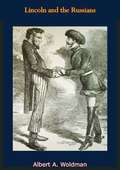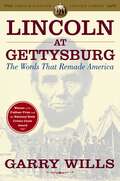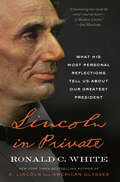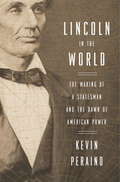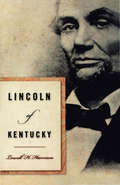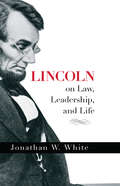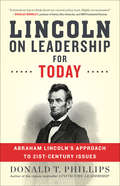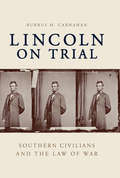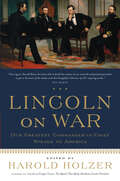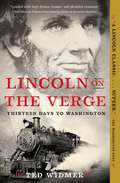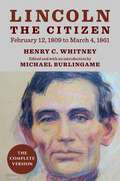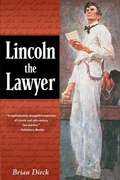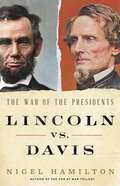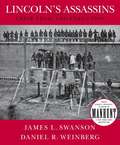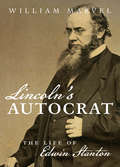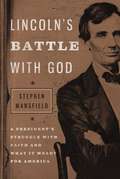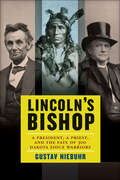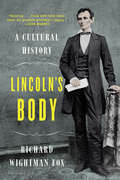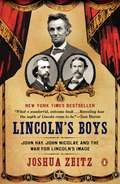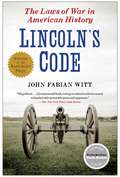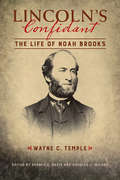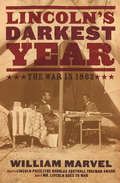- Table View
- List View
Lincoln and the Russians
by Albert A. WoldmanTHE STORY OF LINCOLN AND RUSSIA—VIRTUALLY AN UNKNOWN CHAPTER IN THE LINCOLN SAGALincoln and the Russians, first published in 1952, is the first volume to explore extensively a much neglected aspect of American diplomatic relations: American-Russian relations prior to the First World War. It is only since the Russian Revolution of 1917 that emphasis has been placed on the subject of American-Russian diplomacy; yet Russia played an important part in achieving Lincoln’s goal in the Civil War: the preservation of Union. Although the purchase of Alaska is a familiar story, the story preceding it reveals an aspect of history in which Russia contributed materially toward preventing British and French recognition of and aid to the confederacy.Author Albert A. Woldman has investigated thoroughly the reports to St. Petersburg of Eduard de Stoeckl, Russian Minister to the United States. He has quoted much of the correspondence which passed between the American and Russian diplomatic forces, and the result is a unique contribution to Americana and Lincolniana.
Lincoln at Gettysburg: The Words that Remade America
by Garry WillsThe power of words has rarely been given a more compelling demonstration than in the Gettysburg Address. Lincoln was asked to memorialize the gruesome battle. Instead, he gave the whole nation "a new birth of freedom" in the space of a mere 272 words. His entire life and previous training, and his deep political experience went into this, his revolutionary masterpiece.By examining both the address and Lincoln in their historical moment and cultural frame, Wills breathes new life into words we thought we knew, and reveals much about a president so mythologized but often misunderstood. Wills shows how Lincoln came to change the world and to effect an intellectual revolution, how his words had to and did complete the work of the guns, and how Lincoln wove a spell that has not yet been broken.
Lincoln in Private: What His Most Personal Reflections Tell Us About Our Greatest President
by Ronald C. White&“A fascinating tour inside the mind—and the heart—of Abraham Lincoln . . . An important and timeless work.&”—Jon Meacham, Pulitzer Prize–winning author of His Truth Is Marching On From the New York Times bestselling author of A. Lincoln and American Ulysses, a revelatory glimpse into the intellectual journey of our sixteenth president through his private notes to himself, explored together here for the first timeA deeply private man, shut off even to those who worked closely with him, Abraham Lincoln often captured &“his best thoughts,&” as he called them, in short notes to himself. He would work out his personal stances on the biggest issues of the day, never expecting anyone to see these frank, unpolished pieces of writing, which he&’d then keep close at hand, in desk drawers and even in his top hat. The profound importance of these notes has been overlooked, because the originals are scattered across several different archives and have never before been brought together and examined as a coherent whole.Now, renowned Lincoln historian Ronald C. White walks readers through twelve of Lincoln&’s most important private notes, showcasing our greatest president&’s brilliance and empathy, but also his very human anxieties and ambitions. We look over Lincoln&’s shoulder as he grapples with the problem of slavery, attempting to find convincing rebuttals to those who supported the evil institution (&“As I would not be a slave, so I would not be a master. This expresses my idea of democracy.&”); prepares for his historic debates with Stephen Douglas; expresses his private feelings after a defeated bid for a Senate seat (&“With me, the race of ambition has been a failure—a flat failure&”); voices his concerns about the new Republican Party&’s long-term prospects; develops an argument for national unity amidst a secession crisis that would ultimately rend the nation in two; and, for a president many have viewed as not religious, develops a sophisticated theological reflection in the midst of the Civil War (&“it is quite possible that God&’s purpose is something different from the purpose of either party&”). Additionally, in a historic first, all 111 Lincoln notes are transcribed in the appendix, a gift to scholars and Lincoln buffs alike.These are notes Lincoln never expected anyone to read, put into context by a writer who has spent his career studying Lincoln&’s life and words. The result is a rare glimpse into the mind and soul of one of our nation&’s most important figures.
Lincoln in the Atlantic World
by Louise L. StevensonThis original and wide-ranging work reveals how Abraham Lincoln responded to prompts from around the globe to shape his personal appearance, political appeal, and presidential policies. Throughout his life, he learned lessons about slavery, American politics, and international relations from sources centered in Africa, Britain, and the European continent. Answering questions that previous scholars have not thought to ask, the book opens the vision of Lincoln as a global republican. Thanks to its new stories and compelling analyses, this book provides a provocative and stimulating read that will generate debate at both high and popular levels.
Lincoln in the World
by Kevin PerainoA captivating look at how Abraham Lincoln evolved into one of our seminal foreign-policy presidents--and helped point the way to America's rise to world power. This is the story of one of the most breathtaking feats in the annals of American foreign policy--performed by one of the most unlikely figures. Abraham Lincoln is not often remembered as a great foreign-policy president. He had never traveled overseas and spoke no foreign languages. And yet, during the Civil War, Lincoln and his team skillfully managed to stare down the Continent's great powers--deftly avoiding European intervention on the side of the Confederacy. In the process, the United States emerged as a world power in its own right. Engaging, insightful, and highly original, Lincoln in the World is a tale set at the intersection of personal character and national power. The narrative focuses tightly on five distinct, intensely human conflicts that helped define Lincoln's approach to foreign affairs--from his debate, as a young congressman, with his law partner over the conduct of the Mexican War, to his deadlock with Napoleon III over the French occupation of Mexico. Bursting with colorful characters like Lincoln's bowie-knife-wielding minister to Russia, Cassius Marcellus Clay; the cunning French empress, Eugénie; and the hapless Mexican monarch Maximilian--Lincoln in the World draws a finely wrought portrait of a president and his team at the dawn of American power. In the Age of Lincoln, we see shadows of our own world. The international arena in the 1860s could be a merciless moral vacuum. Lincoln's times demanded the cold, realistic pursuit of national interest, and, in important ways, resembled our own increasingly multipolar world. And yet, like ours, Lincoln's era was also an information age, a period of rapid globalization. Steamships, telegraph wires, and proliferating new media were transforming the world. Global influence required the use of "soft power" as well as hard. Anchored by meticulous research into overlooked archives, Lincoln in the World reveals the sixteenth president to be one of America's indispensable diplomats--and a key architect of America's emergence as a global superpower. Much has been written about how Lincoln saved the Union, but Lincoln in the World highlights the lesser-known--yet equally vital--role he played on the world stage during those tumultuous years of war and division.
Lincoln of Kentucky
by Lowell H. Harrison&“Covers Lincoln&’s background in Kentucky and his lifelong association with the state of his birth . . . entertaining . . . well researched.&” —Louisville Courier-Journal Young Abraham Lincoln and his family joined the migration over the Ohio River, but it was Kentucky—the state of his birth—that shaped his personality and continued to affect his life. His wife was from the commonwealth, as were each of the other women with whom he had romantic relationships. Henry Clay was his political idol; Joshua Speed of Farmington, near Louisville, was his lifelong best friend; and all three of his law partners were Kentuckians. During the Civil War, Lincoln is reputed to have said, &“I hope to have God on my side, but I must have Kentucky.&” He recognized Kentucky&’s importance as the bellwether of the four loyal slave states and accepted the commonwealth&’s illegal neutrality until Unionists secured firm control of the state government. In this book, Lowell Harrison emphasizes the particular skill and delicacy with which Lincoln handled the problems of a loyal slave state populated by a large number of Confederate sympathizers. It was not until decades later that Kentuckians fully recognized Lincoln&’s greatness and paid homage to their native son. &“An outstanding work.&” —James A. Ramage, author of Gray Ghost: The Life of Col. John Singleton Mosby
Lincoln on Law, Leadership, and Life
by Jonathan WhiteWisdom and stories from one of America's most unique legal mindsAbraham Lincoln's success as a politician was rooted in experience in the courtroom. Despite a presidency plagued with moral and legal crises, this self-taught prairie lawyer deftly led the nation by relying on the core principles he honed in his early career: honestly, self-discipline, and a powerful sense of social responsibility. Aspiring and practicing lawyers alike often looked to Lincoln for guidance--and his hard-won wisdom is as relevant today as ever.Drawn from his correspondence with aspiring attorneys as well as observations from friends and colleagues, Lincoln on Law, Leadership, and Life is an insightful collection of Lincoln's timeless quotes, quips, and stories."This should be required reading in every law school in America."--Frank J. Williams, retired Chief Justice, Rhode Island Supreme Court, and founding chair of The Lincoln Forum.
Lincoln on Leadership for Today: Abraham Lincoln's Approach to 21st-Century Issues
by Donald T. Phillips&“Phillips has a gift for making 19th-century history relevant for the 21st century . . . a marvelous way to think about our current policy woes.&” —Douglas Brinkley, New York Times-bestselling author of American Moonshot How can President Lincoln&’s wisdom be applied to the most pressing conflicts of modern-day America? With a fresh and perceptive reading of Lincoln&’s own writings and speeches, bestselling author Donald T. Phillips reveals how America&’s sixteenth president handled many of the same national dilemmas we face today. Looking to his exemplary leadership of a fractured nation, Phillips offers a deeply relevant analysis of how Lincoln&’s example could help forge solutions to the many issues and divisions challenging our country now. &“[An] intelligent and often moving look at one of the nation&’s greatest presidents . . . Using his extensive knowledge of Lincoln, Phillips makes convincing cases throughout for what the nineteenth-century statesman&’s opinion would be on a wide array of issues faced by the twenty-first-century United States, including climate change, torture, immigration, and equal pay for women. For readers who find present-day politics almost too much to contemplate, Phillips&’s closing vision of Lincoln witnessing the &‘current state of affairs&’ will be especially poignant and bittersweet.&” —Publishers Weekly
Lincoln on Trial: Southern Civilians and the Law of War
by Burrus M. CarnahanThe acclaimed Lincoln scholar examines the president&’s treatment of Southern civilians during the Civil War, shedding new light on his wartime conduct. By twenty-first century standards, President Lincoln's adherence to the laws of war would be considered questionable. But could be condemned as a war criminal based on the accepted standards of his time? Lincoln&’s critics, past and present, have not hesitated to make the charge, while his apologists defend his actions as reasonable and humane. In Lincoln on Trial, Burrus M. Carnahan examines Lincoln's leadership throughout the Civil War as he struggled to balance his own humanity against the demands of his generals. Carnahan specifically scrutinizes Lincoln's conduct toward Southerners in light of the international legal standards of his time as the president wrestled with issues such as bombardment of cities, collateral damage to civilians, seizure and destruction of property, forced relocation, and the slaughter of hostages. Carnahan investigates a wide range of historical materials from accounts of the Dahlgren raid to the voices of Southern civilians who bore the brunt of extensive wartime destruction. Through analysis of both historic and modern standards of behavior in times of war, a sobering yet sympathetic portrait of one of America's most revered presidents emerges.
Lincoln on War: Our Greatest Commander-in-Chief Speaks to America
by Harold HolzerPresident Lincoln used his own weapons—his words— to fight the Civil War as brilliantly as any general who ever took the field. In Lincoln on War, historian Harold Holzer gathers and interprets Lincoln’s speeches, letters, memoranda, orders, telegrams, and casual remarks, organizing them chronologically and allowing readers to experience Lincoln’s growth from an eager young Indian War officer to a middle-aged dove congressman to a surprisingly hardened and determined hawk as the Union’s commander-in-chief.We observe a man willing to sacrifice life and treasure in unprecedented quantities, to risk wounding the pride of vain generals, and even to mislead the public if it meant the preservation of an unbreakable union of states, the destruction of slavery, and the restoration of America as an example to inspire the world. This volume covers strategy; tactics; the endless hiring, sustaining, motivating, and dismissal of commanders; military discipline; and military technology. Modern commanders-in-chief have repeatedly quoted Lincoln to justify their own wars, so it behooves us as citizens to know Lincoln’s record well. From masterpieces such as the Gettysburg Address to lesser-known meditations on God’s purposes, Lincoln on War is the first book to highlight exclusively Lincoln’s sublime and enduring words on war.
Lincoln on the Verge: Thirteen Days to Washington
by Ted WidmerAs a divided nation plunges into the deepest crisis in its history, Abraham Lincoln boards a train for Washington and his inauguration—an inauguration Southerners have vowed to prevent by any means necessary. Drawing on new research, this account reveals the President-Elect as a work in progress, showing him on the verge of greatness, foiling an assassination attempt, and forging an unbreakable bond with the American people. On the eve of his 52nd birthday, February 11, 1861, the President-Elect of the United States, Abraham Lincoln, walked onto a train, the first step of his journey to the White House, and his rendezvous with destiny. But as the train began to carry Lincoln toward Washington, it was far from certain what he would find there. Bankrupt and rudderless, the government was on the verge of collapse. To make matters worse, reliable intelligence confirmed a conspiracy to assassinate him as he passed through Baltimore. It is no exaggeration to say that the fate of the Republic hung in the balance. How did Lincoln survive this grueling odyssey, to become the president we know from the history books? Lincoln on the Verge tells the story of a leader discovering his own strength, improvising brilliantly, and seeing his country up close during these pivotal thirteen days. From the moment the Presidential Special left the station, a new Lincoln was on display, speaking constantly, from a moving train, to save the Republic. The journey would draw on all of Lincoln&’s mental and physical reserves. But the President-Elect discovered an inner strength, which deepened with the exhausting ordeal of meeting millions of Americans. Lincoln on the Verge tells the story of America&’s greatest president and the obstacles he overcame, well before he could take the oath of office and deliver his inaugural address.
Lincoln the Citizen, February 12, 1809 to March 4, 1861: The Complete Version (The UIS Center for Lincoln Studies)
by Henry C. WhitneyWritten by a longtime friend and ally, Lincoln the Citizen offers a rare character study and insightful biography of Lincoln before he became president. Michael Burlingame restores material cut by editors of the original 1907 publication to present Henry Clay Whitney’s work in full. Whitney’s work reveals the legal and political spheres where Lincoln moved while providing eyewitness accounts and intimate stories shared by Lincoln himself. Whitney’s unique vantage point informs analyses of everything from Lincoln’s melancholic temperament to his colorful early career to views on his marriage and family life. Burlingame places Whitney’s singular contributions within Lincoln studies but also weighs criticisms of the book and disputes over what information the author may or may not have invented. A restored edition of an invaluable memoir, Lincoln the Citizen presents a wealth of overlooked biographical detail by one of the people who knew Lincoln best.
Lincoln the Lawyer
by Brian R. DirckThis fascinating history explores Abraham Lincoln's legal career, investigating the origins of his desire to practice law, his legal education, his partnerships with John Stuart, Stephen Logan, and William Herndon, and the maturation of his far-flung practice in the 1840s and 1850s. Brian Dirck also examines Lincoln's clientele, how he charged his clients, and how he addressed judge and jury, as well as his views on legal ethics and the supposition that he never defended a client he knew to be guilty.
Lincoln vs. Davis: The War of the Presidents
by Nigel HamiltonFrom the New York Times bestselling presidential biographer comes the greatest untold story of the Civil War: how two American presidents faced off as the fate of the nation hung in the balance—and how Abraham Lincoln came to embrace emancipation as the last, best chance to save the Union. Of all the books written on Abraham Lincoln, there has been one surprising gap: the drama of how the &“railsplitter&” from Illinois grew into his critical role as U.S. commander-in-chief, and managed to outwit his formidable opponent, Jefferson Davis, in what remains history's only military faceoff between rival American presidents. Davis was a trained soldier and war hero; Lincoln a country lawyer who had only briefly served in the militia. Confronted with the most violent and challenging war ever seen on American soil, Lincoln seemed ill-suited to the task: inexperienced, indecisive, and a poor judge of people&’s motives, he allowed his administration's war policies to be sabotaged by fickle, faithless cabinet officials while entrusting command of his army to a preening young officer named George McClellan – whose defeat in battle left Washington, the nation&’s capital, at the mercy of General Robert E. Lee, Davis&’s star performer. The war almost ended there. But in a Shakespearean twist, Lincoln summoned the courage to make, at last, a climactic decision: issuing as a &“military necessity&” a proclamation freeing the 3.5 million enslaved Americans without whom the South could not feed or fund their armed insurrection. The new war policy doomed the rebellion—which was in dire need of support from Europe, none of whose governments now would dare to recognize rebel &“independence&” in a war openly fought over slavery. The fate of President Davis was sealed. With a cast of unforgettable characters, from first ladies to fugitive coachmen to treasonous cabinet officials, Lincoln vs. Davis is a spellbinding dual biography from renowned presidential chronicler Nigel Hamilton: a saga that will surprise, touch, and enthrall.
Lincoln's Assassins: Their Trial and Execution
by James L. Swanson Daniel R. WeinbergAcclaimed as the definitive illustrated history of Abraham Lincoln's assassination, "Lincoln's Assassins," by James L. Swanson and Daniel R. Weinberg, follows the shocking events from the tragic scene at Ford's Theatre to the trial and execution of Booth's co-conspirators. For twelve days after the president was shot, the nation waited breathlessly as manhunters tracked down John Wilkes Booth--the story that was brilliantly told in Swanson's "New York Times" bestseller, "Manhunt," Then, during the spring and summer of 1865, a military commission tried eight people as conspirators in Booth's plot to murder Lincoln and other high officials, including the secretary of state and vice president. Few remember them today, but once the names Mary Surratt, Lewis Powell, David Herold, George Atzerodt, Edman Spangler, Samuel Arnold, Michael O'Laughlin, and Dr. Samuel Mudd were the most reviled and notorious in America. In "Lincoln's Assassins," Swanson and Weinberg resurrect these events by presenting an unprecedented visual record of almost 300 contemporary photographs, letters, documents, prints, woodcuts, newspapers, pamphlets, books, and artifacts, many hitherto unpublished. These rare materials, which took the authors decades to collect, evoke the popular culture of the time, record the origins of the Lincoln myth, take the reader into the courtroom and the cells of the accused, document the beginning of American photojournalism, and memorialize the fates of the eight conspirators. "Lincoln's Assassins" is a unique work that will appeal to anyone interested in American history, Abraham Lincoln, the Civil War, law, crime, assassination, nineteenth-century photographic portraiture, and the history of American photojournalism.
Lincoln's Autocrat: The Life of Edwin Stanton (Civil War America #1)
by William MarvelEdwin M. Stanton (1814-1869), one of the nineteenth century's most impressive legal and political minds, wielded enormous influence and power as Lincoln's Secretary of War during most of the Civil War and under Johnson during the early years of Reconstruction. In the first full biography of Stanton in more than fifty years, William Marvel offers a detailed reexamination of Stanton's life, career, and legacy. Marvel argues that while Stanton was a formidable advocate and politician, his character was hardly benign. Climbing from a difficult youth to the pinnacle of power, Stanton used his authority--and the public coffers--to pursue political vendettas, and he exercised sweeping wartime powers with a cavalier disregard for civil liberties. Though Lincoln's ability to harness a cabinet with sharp divisions and strong personalities is widely celebrated, Marvel suggests that Stanton's tenure raises important questions about Lincoln's actual control over the executive branch. This insightful biography also reveals why men like Ulysses S. Grant considered Stanton a coward and a bully, who was unashamed to use political power for partisan enforcement and personal preservation.
Lincoln's Battle with God: A President's Struggle with Faith and What It Meant for America
by Stephen MansfieldAbraham Lincoln is the most beloved of all U.S. presidents. He freed the slaves, gave the world some of its most beautiful phrases, and redefined the meaning of America. He did all of this with wisdom, compassion, and wit. Yet, throughout his life, Lincoln fought with God. In his early years in Illinois, he rejected even the existence of God and became the village atheist. In time, this changed but still he wrestled with the truth of the Bible, preachers, doctrines, the will of God, the providence of God, and then, finally, God's purposes in the Civil War. Still, on the day he was shot, Lincoln said he longed to go to Jerusalem to walk in the Savior's steps. What had happened? What was the journey that took Abraham Lincoln from outspoken atheist to a man who yearned to walk in the footsteps of Christ? In this thrilling journey through a largely unknown part of American history, New York Times best-selling author Stephen Mansfield tells the richly textured story of Abraham Lincoln's spiritual life and draws from it a meaning sure to inspire Americans today.
Lincoln's Bishop: A President, A Priest, and the Fate of 300 Dakota Sioux Warriors
by Gustav NiebuhrA history of the Dakota War of 1862, an Episcopal bishop, and his campaign to protect the lives of the Dakota Sioux.It is hard to recall what powerful moral voices Protestant church leaders had in the formative years of the nation. Gustav Niebuhr travels back to the Minnesota frontier of 1862 when Dakota Sioux rose up against pioneering families and slaughtered hundreds. Citizens demanded mass executions and deportations. Into this turmoil stepped Henry Benjamin Whipple, the state’s first Episcopal bishop.Whipple had already loudly decried the crimes and corruption of those managing Indian affairs and warned of calamity. Now he made the case of mercy and a deeper justice, which eventually led to meeting with President Lincoln. Despite being preoccupied with the Civil War, Lincoln was moved to intervene, surprisingly taking the time to review all 303 cases and overturning the death sentence for most of the Indians. Nevertheless, the result was still the largest single execution on American soil.If not for Whipple’s vigorous campaigning, both in state and in Washington, DC, a greater tragedy might well have occurred. His success should haunt us: Where today do we hear these trumpet calls for justice like those given by figures such as Bishop Henry Benjamin Whipple?“[An] enlightening tale of Abraham Lincoln’s other war. . . . A pleasant surprise for the average history buff.” —Kirkus Reviews
Lincoln's Body: A Cultural History
by Richard Wightman FoxEven two hundred years after Abraham Lincoln's death, we, like Walt Whitman, "love the President personally." In a stunning feat of scholarship, insight, and engaging prose, Lincoln's Body explores how a president ungainly in body and downright "ugly" of aspect came to mean so much to us. The very roughness of Lincoln's appearance made him seem all the more common, one of us--as did his sense of humor about his own awkward physical nature. Nineteenth-century African Americans felt deep affection for their "liberator" as a "homely" man who did not hold himself apart. During Reconstruction, Southerners felt a nostalgia for the humility of Lincoln, whom they envisioned as a "conciliator." Later, teachers glorified Lincoln as a symbol of nationhood that would appeal to poor immigrants. Monument makers focused not only on the man's gigantic body but also on his nationalist efforts to save the Union, downplaying his emancipation of the slaves. Among both black and white liberals in the 1960s and 1970s, Lincoln was derided or fell out of fashion. More recently, Lincoln has once again been embodied (as both idealist and pragmatist, unafraid of conflict and transcending it) by outstanding historians, by self-identified Lincolnian president Barack Obama, and by actor Daniel Day-Lewis--all keeping Lincoln alive in a body of memory that speaks volumes about our nation.
Lincoln's Boys
by Joshua ZeitzA timely and intimate look into Abraham Lincoln’s White House through the lives of his two closest aides and confidants Lincoln’s official secretaries John Hay and John Nicolay enjoyed more access, witnessed more history, and knew Lincoln better than anyone outside of the president’s immediate family. Hay and Nicolay were the gatekeepers of the Lincoln legacy. They read poetry and attendeded the theater with the president, commiserated with him over Union army setbacks, and plotted electoral strategy. They were present at every seminal event, from the signing of the Emancipation Proclamation to Lincoln’s delivery of the Gettysburg Address-and they wrote about it after his death. In their biography of Lincoln, Hay and Nicolay fought to establish Lincoln’s heroic legacy and to preserve a narrative that saw slavery-not states’ rights-as the sole cause of the Civil War. As Joshua Zeitz shows, the image of a humble man with uncommon intellect who rose from obscurity to become a storied wartime leader and emancipator is very much their creation. Drawing on letters, diaries, and memoirs, Lincoln’s Boys is part political drama and part coming-of-age tale-a fascinating story of friendship, politics, war, and the contest over history and remembrance. .
Lincoln's Code
by John Fabian WittIn the fateful closing days of 1862, three weeks before Emancipation, the administration of Abraham Lincoln commissioned a code setting forth the laws of war for the armies of the United States. The code announced standards of civilized conduct in wartime concerning issues such as torture, prisoners of war, civilians, spies, and slaves. The code Lincoln approved ultimately shaped the course of the Civil War. And when the war was over, the same code reshaped warfare the world over. By the twentieth century, the 157 articles of Lincoln's code had become the basis of a new international law of war. European powers adopted the American code. International agreements like the Geneva Conventions incorporated and expanded it. In this pathbreaking and deeply original book, John Fabian Witt tells the hidden story of the laws of war in the first century of the United States-and of the extraordinary code that emerged from it to change the course of world history. Lincoln's Code is the haunting and inspiring story of an idea in American history: the idea that conduct in war can be regulated by law. For many, the very idea of a law for war has seemed like an oxymoron. But with sweep and vitality, Witt unfolds the story of the cast of characters who invented the modern laws of war. Washington, Jefferson, and Franklin championed Enlightenment rules for civilized warfare. James Madison went to war in 1812 to vindicate them. Indian conflicts challenged and distorted them. The Mexican War quietly revolutionized them. In the Civil War, Lincoln and a small band of now forgotten figures helped remake those same laws to support Emancipation and advance the Union war effort. Three decades later, a new generation of Americans went into a war of American empire in the Philippines equipped with the very rules Lincoln had laid down. In beautifully crafted prose, Witt brings to life the soldiers and the presidents, the war makers and the pacifists, the Indians and the slaves, the cynics, the utopians, and the pragmatists who struggled with enemies and with one another to shape the United States' vision of the laws of war. A narrative of expansive range and significance, Lincoln's Code depicts the drama of armed conflict and the anguish of human beings grappling with such vexing questions as whether prisoners could be executed; whether there were rules in Indian wars; whether military commissions could try unlawful combatants; whether torture might ever be justified; and whether slaves could be freed in wartime. The code Lincoln issued prohibited cruelty and the infliction of pain for its own sake but left room for vast destruction in the name of a just cause. It condoned the devastation inflicted in Sherman's march to the sea. Yet it also provided a moral foundation for Emancipation and insisted that doing the right thing in situations of grave crisis was indispensable to the legitimacy of modern armies. Witt's engrossing exploration of the dilemmas at the heart of the laws of war is a prehistory of our own era. Today the world once again confronts raging legal and moral controversy over the conduct of war. Lincoln's Code reveals that the controversies of the twenty-first century have roots going back to the beginnings of American history. In a time of heated controversy about the nation's conduct in wartime, Lincoln's Code is a compelling story of ideals under pressure and a landmark contribution to our understanding of the American experience.
Lincoln's Code: The Laws of War in American History
by John Fabian WittPulitzer Prize FinalistBancroft Prize WinnerABA Silver Gavel Award WinnerA New York Times Notable Book of the YearIn the closing days of 1862, just three weeks before Emancipation, the administration of Abraham Lincoln commissioned a code setting forth the laws of war for US armies. It announced standards of conduct in wartime--concerning torture, prisoners of war, civilians, spies, and slaves--that shaped the course of the Civil War. By the twentieth century, Lincoln's code would be incorporated into the Geneva Conventions and form the basis of a new international law of war. In this deeply original book, John Fabian Witt tells the fascinating history of the laws of war and its eminent cast of characters--Washington, Jefferson, Franklin, Madison, and Lincoln--as they crafted the articles that would change the course of world history. Witt's engrossing exploration of the dilemmas at the heart of the laws of war is a prehistory of our own era. Lincoln's Code reveals that the heated controversies of twenty-first-century warfare have roots going back to the beginnings of American history. It is a compelling story of ideals under pressure and a landmark contribution to our understanding of the American experience.
Lincoln's Confidant: The Life of Noah Brooks (The Knox College Lincoln Studies Center)
by Douglas L. Wilson Rodney O. Davis Wayne C. TempleAcclaimed as one of the great Lincoln scholars, Wayne C. Temple offers the long-awaited first biography of Noah Brooks, the influential Illinois journalist who championed Abraham Lincoln in state politics and became his almost daily companion during the Civil War. Best remembered as one of the president's few true intimates, Brooks was also a nationally recognized man of letters who mingled with the likes of Mark Twain and Bret Harte. Temple draws on archives and papers long thought lost to re-create Brooks's colorful life and relationship with Lincoln. Brooks's closeness to the president made him privy to Lincoln's thoughts on everything from literature to spirituality. Their frank conversations contributed to the wealth of journalism and personal observations that still make Brooks a much-quoted source for biographers, historians, and Lincoln aficionados. A grand history and unparalleled scholarly resource, Lincoln's Confidant is the story of an extraordinary friendship by one of the giants of Lincoln scholarship.
Lincoln's Darkest Year: The War in 1862
by William MarvelA portrait of a pivotal chapter in the Civil War, &“featuring scheming politicians, bumbling generals, and an increasingly disheartened Northern public&” (Brooks Simpson, author of Ulysses S. Grant: Triumph Over Adversity, 1822–1865). In Mr. Lincoln Goes to War, award-winning historian William Marvel focused on President Abraham Lincoln&’s first year in office. In Lincoln&’s Darkest Year, he paints a picture of 1862—again relying on recently unearthed primary sources and little-known accounts to offer newfound detail of this tumultuous period. Marvel highlights not just the actions but also the deeper motivations of major figures, including Gen. Ulysses S. Grant, Jefferson Davis, George B. McClellan, Stonewall Jackson, and, most notably, Lincoln himself. As the action darts from the White House to the battlefields and back, the author sheds new light on the hardships endured by everyday citizens and the substantial and sustained public opposition to the war. Combining fluid prose and scholarship with the skills of an investigative historical detective, Marvel unearths the true story of our nation&’s greatest crisis.
Lincoln's Ethics
by Thomas L. CarsonUnlike many important leaders and historical figures, Abraham Lincoln is generally regarded as a singularly good and morally virtuous human being. Lincoln's Ethics assesses Lincoln's moral character and his many morally fraught decisions regarding slavery and the rights of African-Americans, as well as his actions and policies as commander in chief during the Civil War. Some of these decisions and policies have been the subject of considerable criticism. Lincoln undoubtedly possessed many important moral virtues, such as kindness and magnanimity, to a very high degree. Despite this, there are also grounds to question the goodness of his character. Many fault him as a husband, father and son, and many claim that he was a racist. Carson explains Lincoln's virtues and assesses these criticisms.
